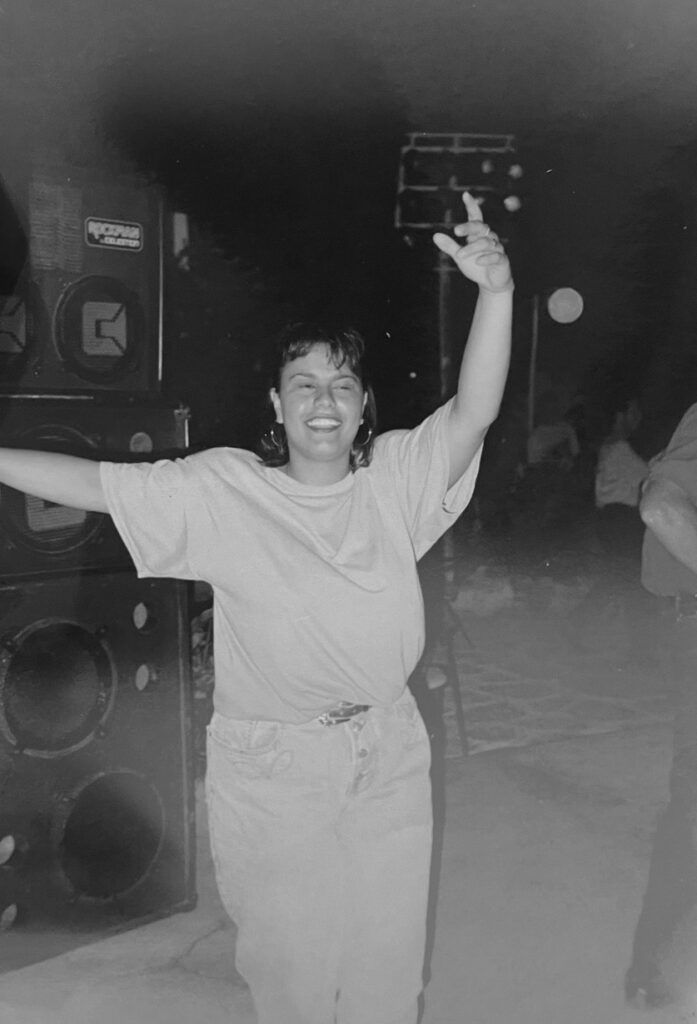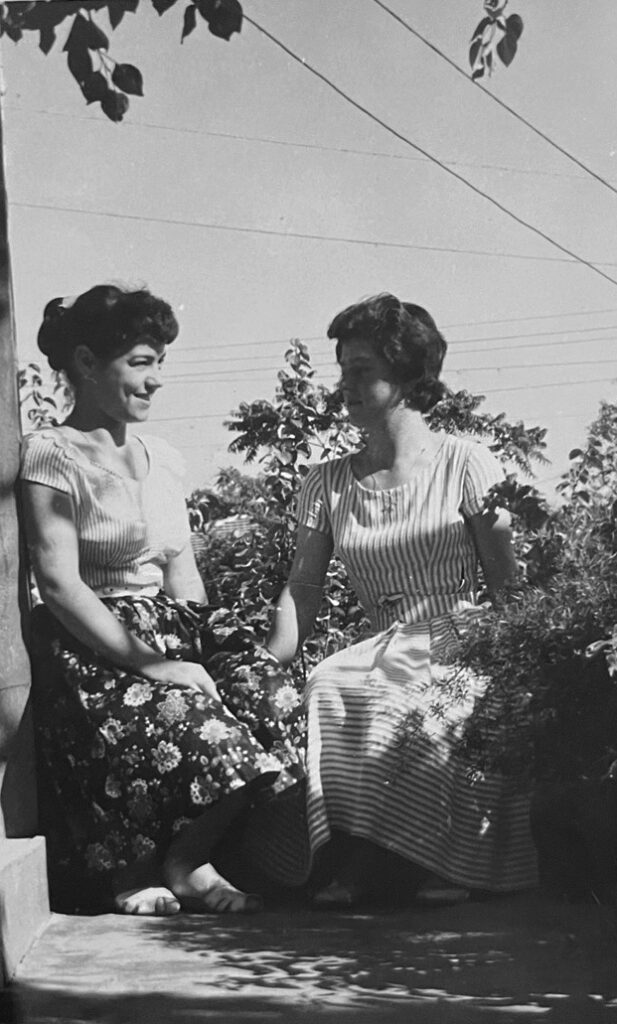By Madeline Kwan-Chiarelli
The sounds of Wii tennis escape the large TV screen in the farthest corner of the room, in front of the white wood fireplace that no one ever uses. To the right sits a worn leather couch and three generations of women.
Each woman sits in what looked to be their ‘preferred’ seat in the dimly lit room. Kathrine Mentzas (a member of the Silent Generation) rests on extra padded pillows that help keep her body sitting upright. Helen Alexandrovich (Gen X) meanwhile leans back in her reclined couch position, draped in soft blankets. Aeva Alexandrovich (Gen Z) attempts to stop the family’s black poodle-mix puppy from
In any generation, growing up and entering adulthood can feel like you’ve come to a crossroads: although you can legally purchase alcohol, you are still financially dependent on your family and it can be debilitating to be under constant pressure to make important decisions, decide whether or not to attend post-secondary school, figure out how to pay for everything, and plan out your future till retirement.
While previous generations were also subjected to the pressure of planning their future, Gen Z is made aware day after day that even with a steady income, financial independence may not be an option. For Gen Z, the decision to pursue post-secondary education is often motivated by fear of future unemployment and financial insecurity and less driven by genuine career ambitions.
Helen remembers life before cellphones, referring to the “simple life,” she lived growing up as part of Gen X. Before the early ‘90s and 2000s, most means of communication with others were through a landline phone or by leaving your house. “We had genuine connections,” as she put it.
It was a taxi that you called, not an Uber. You took photos with a camera that did nothing else and had the film developed instead of taking pictures with a phone and posting them to social media (which didn’t exist). Your future was secure—everyone you knew had a job and a house, and you would too, so there was no need for you to worry. You hung out with your friends instead of using a group chat (because there was no group chat), and everything seemed more affordable.
Gen Z was born into the digital age, never knowing lives free of social media, nanny cams, apps that trace them or ubiquitous access to data and information.
Aeva speaks longingly about the stories Kathrine and Helen have told her about previous generations loving their neighbours, comparing that to now when everyone appears to be in competition with each other.
“Current generations are under more pressure to perform than previous cohorts,” agreed Anders Holm, a sociology professor at Western University who has studied generational data for years.
“When I was a young person, I went to university and graduate school in the 1960’s and got my first real job in 1968. We didn’t worry about the future, the future was assured… we didn’t worry that we weren’t going to have a job, we didn’t worry we wouldn’t have enough income,” said John Isbister, a professor of Economics at Toronto Metropolitan University.
“It wasn’t on our radar,” he said.
In a recent Zoom interview, Holm sat in front of a large white floor-to-ceiling bookshelf from his vacation in Europe, as he described why older generations think they had it worse.
“We always think that, ‘Oh we were struggling harder,’ ‘we couldn’t afford a car,’ ‘we couldn’t buy a house when we wanted,’ and so forth. Because [society’s] become richer and richer, the older generations think that the younger generations problems are kind of ‘first world problems’—not really something to struggle with.”
He spoke about growing up in the Cold War period, where there was an “instant fear of nuclear apocalypse.” Comparing his own situation to people who experienced the Second World War, “they must have endured things that we can only imagine.” Or even before this time, he said it must have been horrific fighting in battle or even being in Germany.
Previous generations have encountered their own issues pertaining to their own time frame, however, Holm pointed out that Gen Z is going to be the most “unequal generation ever” due to the unequal income distribution among those who enter the labour market now.
And because low-income individuals have not benefited from the economic growth of the past decades, achieving financial independence today is more challenging than it was 50 years ago, according to Isbister.
“No one I know has any plans to purchase a home. We are aware that it is incredibly expensive. I believe our generation is focused on purchasing items that are better than what other people have and that we can afford,” Aeva said.
“It’s hard to have a long-term plan,” said Lisa Sedore, a registered psychologist. “How do you start on a path without knowing what it’s going to look like in the future?”
Kathrine was originally a seamstress until she left to support her husband’s ambition to open a restaurant, something many women in this generation did to support their husband’s aspirations.
In those days, wives would accompany their husbands out of love and respect; it had nothing to do with “not standing up for yourself or abusive dominating behaviours,” she explained.
The 86-year-old immigrated to Canada over 50 years ago with her husband and the two of them had next to nothing. They shared a small apartment while her husband did small cash-paying labour jobs and Kathrine worked as a seamstress until they had enough money to open their own restaurant in Caledonia, Ont.
They paid roughly $80,000 for her family’s forever home in Hamilton, Ontario in the early 1970s after managing the restaurant for about a year.
Before coming to Canada, Kathrine said she grew up in Greece with her parents and five sisters. The Mentzas family used to provide for themselves by baking homemade bread and tending to their gardens of fruits and vegetables—preparing everything by hand.
Today, you will find Kathrine at the house she bought many years ago, cooking most of the meals, using her seamstress skills to mend the holes in her grandchildren’s clothes, and yelling at the family in Greek to stop cursing.
Helen, Kathrine’s second child, was raised in a lower-middle-class environment. The house she grew up in is now signed in her name and houses her three children, husband, and mother. She talks about being home by herself at a young age while her parents were at work and playfully added,
“the cops are gonna be at your door, five minutes later,” if she left her kids at home alone now.Helen was running the restaurant her parents had established years before, but she knew this wasn’t going to be her forever job. After Kathrine sold the restaurant, Helen intended to become a hairdresser with her own salon, but after her father had passed she realized she had lost her passion for the hairdressing industry.
She is thankful that she grew up without social media because she has witnessed the rise of the repercussions that excessive use of social media has on users.
Sedore says that as a child in Gen X, if you had a fight with your friends, you’d go home and forget about it by the next day. “Things were pretty simple,” she said.
“Now, everybody’s online all night. Like, you get in a conflict and it escalates rather than receding over the course of the evening. The social world has become more complex because of this,” she added.
According to Sedore, studies have shown that exposure to social media at a young age, has a stronger impact on how they operate. Those in Generation Z, who were exposed to social media as teenagers, have a stronger sense of self and are more conscious of their identity because they had time without a social media presence beforehand unlike newer generations.
Aeva says she feels as if technology has taken over every aspect of her life and that she is constantly
switching between different platforms. She’ll check her personal and school email, as well as Instagram, Facebook, and Snapchat, as well as any incoming WhatsApp and Messenger messages multiple times a day.Statistics Canada’s 2018 Canadian Internet Use Survey looked at the negative effects for individuals aged 15 to 64 using social media platforms. Four of the six outcomes, according to the survey, were reported by younger people far more frequently. Lost sleep was most common among 15 to-19-year-olds, while attention problems were most common among 15 to-24-year-olds. In this study, those aged 15 to 34 were more likely to report experiencing anxiety, depression, or envy of others.
She spoke of the fine line she must tread between “balance” and “burnout,” emphasizing the need to obtain work part-time at Starbucks while also being enrolled in the nursing program that’s affiliated with McMaster University and Mohawk College. “Good thing I get a free coffee every shift because I need all of the energy I can get in order to accomplish everything in a day’s work,” she joked.
“I believe life is more difficult now, and other generations think we’re just lazy,” Aeva said, “but I doubt any older generation would have done anything differently if they were in the same situation that we’re in now.”







